As part of the Chicago History Museum’s Aquí en Chicago project, a Community Awareness Council was formed and is charged with: (1) building relationships among and across the Chicago area’s many different Latine communities, (2) bringing as many voices to the table as possible, (3) networking through this group, and (4) learning of ways the Museum can serve diverse Latine communities.
Ashley Dequilla was invited by CHM curator of civic engagement and social justice Elena Gonzales to be a Council partner. In this blog post, Dequilla writes about her role as the de facto archivist and collection manager of the Filipino American Historical Society of Chicago. She is also the moving image archivist at University of Chicago South Side Home Movie Project.
In October 2022, I attended a Filipino American History Month program at the Skokie Public Library that led to an encounter that would unknowingly change my life and history itself. It was there that I connected with Tito Ruben Salazar, a respected community organizer who wished to introduce me to Estrella Alamar (1936–2022), a self-taught cultural historian and the founder of the Filipino American Historical Society of Chicago (FAHSC). The FAHSC was established in Chicago’s Hyde Park community area as a 501(c)(3) nonprofit organization in 1986 with the sole mission of recording, preserving, and sharing Filipino American history within the greater Chicago area. The FAHSC collection comprises historical photographs, documents, newsletters, posters, cassettes, tapes, analog films, cultural artifacts, and more.
The weekend I was supposed to meet Estrella to film her interview, she lost her battle to cancer. I felt extremely compelled by the untimeliness of her death and the urgent need to care for the legacy she left behind. I was the videographer of her funeral, and then I volunteered at her home in Hyde Park every weekend in 2023. A loving and devoted team of volunteers wished to salvage the overwhelming mass of historical materials (and other things) that she accumulated throughout her life. By the end of the year, more than 400 boxes of ephemera were compiled and moved to storage at the HANA Center in Albany Park and are now in the beginning stages of processing with support from DePaul University’s Special Collections team of archivist consultants.
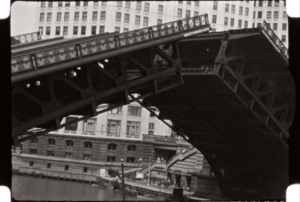
Chicago of Today (1936) is an architectural survey featuring sweeping views of downtown Chicago, Garfield Park Conservatory, University of Chicago, and Lincoln Park Zoo. All film stills courtesy of the Filipino American Historical Society of Chicago
After Estrella’s passing, I stepped into the role of FAHSC’s de facto archivist and collection manager with the intention of stabilizing the archive toward long-term preservation and raising awareness of it for scholars, artists, and community members. I partnered with University of Illinois Chicago’s Special Collections to safehouse paper documents, such as photographs and documents, and with the Chicago Film Society and the University of Chicago’s South Side Home Movie Project (SSHMP) to digitize and preserve audiovisual material such as slides, reel-to-reel audio, cassette tapes, and analog film. A selection of digitized items can be viewed online through the Chicago Collections Consortium.
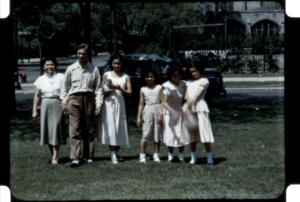
Calumet Park (1939) shows footage of the Nueva Vizcaya Association community members engaged in leisure activities in and around Chicago, notably featuring FAHSC founder Estrella Alamar.
The Filipino American Historical Society of Chicago collection has more than 300 16mm film reels that date from 1926 to 1990. These films are priceless and groundbreaking material as autonomous filmic evidence of Filipino American people from the first half of the 20th century. Nicholas G. Viernes (1902–91), lovingly referred to as “Uncle Nick,” was the filmmaker behind the camera for most of this collection. Viernes immigrated to the United States by ship in 1926, arriving in the Pacific Northwest and working as a migrant farmer until finally settling in Chicago.
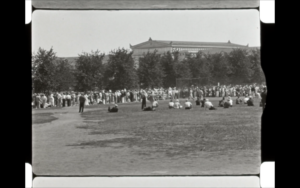
All-Star Baseball Meets at Grant Park (1939) has footage of an inter-state Filipino migrant league baseball championship in front of the Field Museum of Natural History.
He was considered the unofficial Filipino community film historian and cameraman, documenting many events on 16mm film. His life on film features travel, community events and gatherings, family celebrations, and leisure activities.
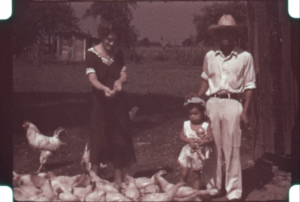
Little Farmers of Reynoldsburg (1936) and Reynoldsburg Pt. 2 (1937) are home movies documenting an interracial Filipino American family’s life on a farm in rural Ohio.
Only five out of 350 films made in the Philippines prior to World War II have survived. The FAHSC has over a dozen prewar home movies made by Viernes that recover the loss of Philippine cinematic memory across the diaspora. The National Film Preservation Foundation (NFPF) has selected five of the earliest and most historically significant pre-WWII FAHSC films for federally funded grant awards to ensure their full preservation: Little Farmers of Reynoldsburg (1936) and Reynoldsburg Pt. 2 (1937), All-Star Meets at Grant Park (1939), Chicago of Today (1936), and Calumet Park (1939).
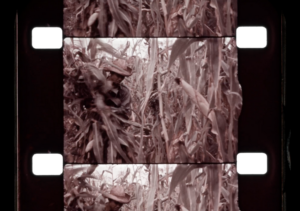
Little Farmers of Reynoldsburg (1936) and Reynoldsburg Pt. 2 (1937) are home movies documenting an interracial Filipino American family’s life on a farm in rural Ohio.
We invite you to learn more about the Filipino American Historical Society of Chicago at one of our upcoming events.
- Saturday, August 24, 10:00 a.m.–2:00 p.m. – Archive Crawl at the HANA Center
- Friday, August 30, 7:00 p.m. – Presentation and screening of NFPF-awarded films at Chicago Filmmakers
- Friday, October 18, 2:00 p.m. – Presentation and screening of NFPF-awarded films at the Harold Washington Library Center
- Saturday–Sunday, October 19–20 – Filipino American Historical Society of Chicago Museum reopens after 21 years, which is the FAHSC mission and Estrella’s dying wish. Visit us in Studio 316 at Mana Contemporary.
If you’re interested in donating to, becoming a member of, or volunteering with the Filipino American Historical Society of Chicago, please email us at fanhs.greaterchicago@gmail.com
Special thanks to Mónica Félix + Chicago Cultural Alliance, and Elena Gonzales + Aquí en Chicago.